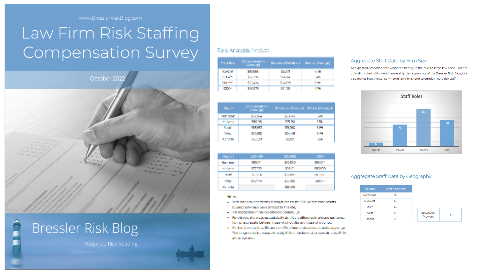Risk News — Firm Merger Means for Conflicts Concerns, Law Firm AML and PR/Reputation Risk
Posted on
“Troutman Pepper, Locke Lord Merger Conflicts Rattle Lawyers” —
- “Some Locke Lord affordable housing and energy lawyers may be unable to represent longtime clients after a merger with Troutman Pepper Hamilton Sanders, according to three people familiar with the matter.”
- “At least a trio of lawyers have left Locke Lord, citing such potential challenges post-merger, the people said. The firms in a statement declined to comment on client conflicts and said merger talks are ongoing.”
- “The conflicts snag, common in Big Law tie-ups, shows the complexity of patching together two large operations without having the combined firm represent many clients with adverse interests toward one another. Firms can seek conflict waivers, though clients often hesitate to approve them.”
- “Troutman Pepper in the past two years has represented large financial services companies and affiliated entities, including JP Morgan Chase & Co., Wells Fargo & Co., and Bank of America Corp., the firm disclosed June 20 in an application to represent a client in a bankruptcy case.”
- “Those banks have provided financing to Locke Lord clients for housing development and energy deals, according to press releases by the law firm. The firm represented Tampa Electric Co. in two short-term credit facility transactions with financing from JP Morgan and Bank of America, according to a Locke Lord press release in April 2023.”
- “A Troutman Pepper client, electric and gas company Ameren Illinois, challenged a request by Locke Lord for guidance on wind and solar generating equipment, a 2021 filing with the Federal Energy Regulatory Commission shows. The firm didn’t identify a client in the request.”
Answering Concerns” - “Locke Lord told lawyers concerned about losing clients due to the merger that work would be made up through new business from Troutman, according to two people familiar with the matter. Some lawyers found that explanation unsatisfactory, the two people said. They spoke on condition of anonymity to protect relationships at the firm.”
“‘Firms Fear the PR Hit, Not the Sanction’: Big Law on Edge After Simpson Thacher AML Prosecution” —
- “Earlier this week, Simpson Thacher & Bartlett became the latest major law firm to find itself on the sharp end of the Solicitors Regulation Authority’s push to ensure compliance with anti-money laundering rules.”
- “Dentons and Clyde & Co have previously come under the gaze of the SRA’s newfound hawkishness on AML frailties in law firms. But it is the news that the regulator has taken action against one of America’s most prestigious firms that has sent ripples across the wider industry.”]
- “Indeed, according to people at another major U.S.-headquartered law firm in London, the story has been widely discussed and set off fears about their own AML practices.”
- “But people with deep knowledge of the SRA and large law firms say that concerns are not so much for the sanction itself, but rather the bad press the news can generate, the effect it can have on Google search results and, consequently, the perception it creates among prospective clients.”
Harder Line” - “To briefly recap, the regulator has alleged that Simpson Thacher ‘failed to have in place fully compliant policies, controls or procedures’ relating to money laundering regulations between June 2017 and January 2023. It has referred the firm to the industry’s Solicitors Disciplinary Tribunal.”
- “One partner at a U.K.-based firm, who has deep knowledge of SRA procedures, suggested that the regulator may be choosing to pursue what it perceives as more ‘watertight’ cases, given the initial failure of its case against Dentons.”
- “The partner believes that firms live in fear of SRA action on AML rules—but not necessarily due to fear of financial penalties. “
- “‘It’s not so much the sanction, it’s the PR hit,’ they said. ‘Some of these firms do a lot of AML work themselves for other organisations. If you google the name of a law firm and ‘AML’, and you see stories about alleged breaches by that firm, rather than the firm’s own AML practice, that’s obviously a concern for management.”
- “‘Therefore any AML failure is bad news, and has the potential to be a problem commercially.'”
- “The news has rattled similarly prestigious U.S. law firms, with people at the London office of another large New York-headquartered law firm expressing concern over the Simpson Thacher news, indicating that many firms will have taken notice.”
- “In a statement following the SRA’s decision on Simpson Thacher earlier this week, a spokesperson from the firm said that the London office was ‘disappointed that the SRA has decided to bring proceedings in the SDT in relation to certain alleged historic AML compliance shortcomings concerning some of our written policies and procedures’, adding that ‘at no point did any money laundering occur nor was there any harm to clients or third parties in connection with the alleged shortcomings’. “










